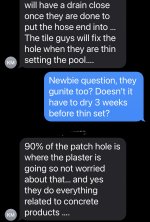After the gunite was cured the plumber came and noticed the jets were positioned too low. They removed a large amount of gunite and fixed the jets. I attached a pic of some of the conversation with the builder. Plus today he told my husband that the material that will fill the hole is stronger than gunite. But isn’t the shell supposed to be gunite?
Thank you ahead of time!
Thank you ahead of time!




